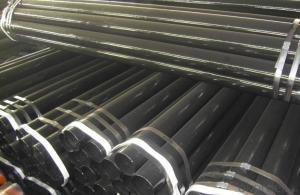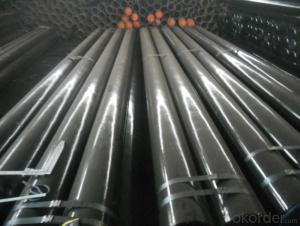Seamless steel pipe API 5L/ASTM A 106/ASTM A53GR.B
- Loading Port:
- Tianjin
- Payment Terms:
- TT or LC
- Min Order Qty:
- 10 m.t.
- Supply Capability:
- 5000 m.t./month
OKorder Service Pledge
OKorder Financial Service
You Might Also Like
Seamless pipe possesses a hollow section and without seam around the strip steel. It is produced with solid bar or steel ingot by perforating machine. Since the facture process does not include any welding, seamless pipes are stronger and more durable the welding pipes. We believe that seamless pipe has better pressure resistance and security than other classifications, and was usually more easily available than welded pipe.
2、Main Features of the Seamless Pipe:
• High working accuracy
• High strength
• Small inertia resistance
• Strong therming dissipine ability
• Good appearance
• Reasonble price
3、Seamless Pipe Specification:
Standard | GB, DIN, ASTM ASTM A106-2006, ASTM A53-2007 |
Grade | 10#-45#, 16Mn 10#, 20#, 45#, 16Mn |
Thickness | 8 - 33 mm |
Section Shape | Round |
Outer Diameter | 133 - 219 mm |
Place of Origin | Shandong, China (Mainland) |
Secondary Or Not | Non-secondary |
Application | Hydraulic Pipe |
Technique | Cold Drawn |
Certification | API |
Surface Treatment | factory state or painted black |
Special Pipe | API Pipe |
Alloy Or Not | Non-alloy |
Length | 5-12M |
Outer Diameter | 21.3-610mm |
Grade | 20#, 45#, Q345, API J55, API K55, API L80, API N80, API P110, A53B |
Standard | ASME, ASTM |
1) Material:20#(ASTM A 106/A53 GRB.API5LGRB,GB),45#,16Mn,10#.
2) Specification range: OD: 21.3-610mm, WT:6-70mm, length:6-12m or according to the requirement of clients.
3) Executive standards: GB, ASME API5L.ASTM A 106/A53,Despite of the above standards, we can also supply seamless steel pipe with standard of DIN, JIS, and so on, and also develop new products according to the requirements of our clients!
4) Surface: black lacquered, varnish coating or galvanized.
5) Ends: Beveled or square cut, plastic capped, painted.
6) Packing: bundles wrapped with strong steel strip, seaworthy packing.
4、Packaging & Delivery:
Packaging Details: | seaworthy package, bundles wrapped with strong steel strip |
Delivery Detail: | 15-30days after received 30%TT |
5、FAQ of Seamless Pipe:
①How is the quality of your products?
Our products are strictly in accordance with international and domestic standard. Every pipe will be tested before delivery. Any quality certification or testing report you want to see, please tell us.
You get our promise: If products’ quality is not in accordance with the promise before you place order, we promise 100% refund.
②How about the price?
Yes, we are factory and can give you the lowest price. “ to save time and be absolutely honest with our business relationship, we quote as low as possible for every client, and discount can be given according to the quantity” is one of our policy, if you are in favor of bargain and dissatisfy our factory price, just don’t waste your time. Our quotation is great.
③Why should you choose us?
Choice happens since our quality and price. Additionally, we can also offer professional products inquiry, products knowledge train (for agents), fast goods delivery, outstanding customer solution proposals. Our service formula: good quality + good price + good service=customer’s trust.
SGS test is available. Customer inspection before shipping is welcome. Third party inspection is OK.
6、Seamless Pipe Images:
- Q:Can steel pipes be used for water supply networks?
- Yes, steel pipes can be used for water supply networks. Steel pipes are commonly used in water supply systems due to their durability, strength, and resistance to corrosion. They are able to withstand high pressure and can safely transport water over long distances. Additionally, steel pipes are highly versatile and can be easily connected, making them suitable for various water supply network applications.
- Q:What is the purpose of galvanizing steel pipes?
- The purpose of galvanizing steel pipes is to protect them from corrosion and increase their lifespan.
- Q:Can steel pipes be used for underground water supply systems?
- Yes, steel pipes can be used for underground water supply systems. Steel pipes are durable, strong, and resistant to corrosion, making them suitable for underground applications. They can withstand high water pressure, provide efficient flow of water, and have a long lifespan. However, it is important to ensure that the steel pipes are properly coated and protected against corrosion to prevent any contamination of the water supply. Additionally, steel pipes are heavier than other materials, which may require additional support during installation. Proper maintenance and regular inspection are also crucial to identify any potential issues and prevent leaks or damage to the underground water supply system.
- Q:How do you measure the thickness of steel pipes?
- One common method to measure the thickness of steel pipes is to use a specialized tool called a pipe thickness gauge. This device consists of a small, handheld instrument with a probe that is inserted into the pipe. By applying pressure to the probe, the gauge can accurately determine the thickness of the pipe's wall. Additionally, ultrasonic testing can also be employed to measure the thickness by sending sound waves through the pipe and analyzing the reflections.
- Q:Can steel pipes be used for piling?
- Certainly, piling can involve the utilization of steel pipes. Steel pipes find widespread use in piling applications owing to their robustness, endurance, and adaptability. They possess the ability to endure the weight and pressure exerted by the soil, thus furnishing a steadfast base for constructions. The process of driving specialized equipment ensures the secure placement of steel pipes employed for piling. Moreover, steel pipes can be effortlessly trimmed and fused to the desired dimensions, rendering them suitable for diverse piling endeavors.
- Q:What is DN50 for welded pipe?
- Refers to the use of welded steel pipe made of DN50 steel pipe, refers to the inside diameter is 50mm, the market of common DN50 pipe also refers to the 2 inch pipe, standard pipe: 3.5mm thickness, pipe diameter 60mm, the weight of 4.88kg/m theory.
- Q:Can steel pipes be used for water wells?
- Yes, steel pipes can be used for water wells. Steel pipes are commonly used for constructing water wells due to their durability, strength, and resistance to corrosion. They can withstand high water pressure and provide a reliable and long-lasting solution for accessing underground water sources.
- Q:Can steel pipes be used for conveying corrosive substances?
- Steel pipes can be used for conveying corrosive substances, but it is important to choose the right type of steel and consider additional protective measures. Stainless steel pipes, for example, are highly resistant to corrosion and can handle a wide range of corrosive substances. However, it is crucial to consider the specific corrosive properties of the substance being conveyed and the concentration levels. In some cases, additional protective coatings or linings may be necessary to prevent corrosion and ensure the longevity of the steel pipes. Regular maintenance and inspection are also essential to detect and address any signs of corrosion to prevent leaks or failures in the piping system. Overall, steel pipes can be used for conveying corrosive substances, but proper material selection, protective measures, and maintenance are vital to ensure safe and efficient operations.
- Q:Are steel pipes suitable for transporting gas?
- Yes, steel pipes are suitable for transporting gas. They have high strength and durability, making them capable of withstanding the pressure and stress involved in gas transportation. Additionally, steel pipes have excellent resistance to corrosion, ensuring the safety and integrity of the gas being transported.
- Q:Can steel pipes be used for conveying hazardous materials?
- Yes, steel pipes can be used for conveying hazardous materials. Steel pipes are known for their durability, strength, and resistance to corrosion, making them suitable for transporting various hazardous substances such as chemicals, gases, and liquids. Additionally, steel pipes can withstand high pressures and temperatures, ensuring the safe and efficient transportation of hazardous materials. However, it is important to ensure proper handling, maintenance, and adherence to safety regulations when using steel pipes for conveying hazardous materials.
1. Manufacturer Overview |
|
|---|---|
| Location | |
| Year Established | |
| Annual Output Value | |
| Main Markets | |
| Company Certifications | |
2. Manufacturer Certificates |
|
|---|---|
| a) Certification Name | |
| Range | |
| Reference | |
| Validity Period | |
3. Manufacturer Capability |
|
|---|---|
| a)Trade Capacity | |
| Nearest Port | |
| Export Percentage | |
| No.of Employees in Trade Department | |
| Language Spoken: | |
| b)Factory Information | |
| Factory Size: | |
| No. of Production Lines | |
| Contract Manufacturing | |
| Product Price Range | |
Send your message to us
Seamless steel pipe API 5L/ASTM A 106/ASTM A53GR.B
- Loading Port:
- Tianjin
- Payment Terms:
- TT or LC
- Min Order Qty:
- 10 m.t.
- Supply Capability:
- 5000 m.t./month
OKorder Service Pledge
OKorder Financial Service
Similar products
New products
Hot products
Related keywords






























